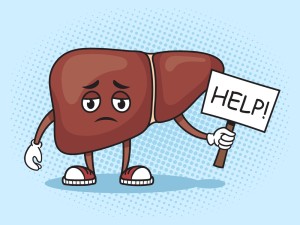Should You be Worried about A Fatty Liver?
 The liver is the major organ for detoxification. It detoxifies, by metabolizing and/or secreting the toxins out of the body. A damaged fatty liver cannot work to do its job.
The liver is the major organ for detoxification. It detoxifies, by metabolizing and/or secreting the toxins out of the body. A damaged fatty liver cannot work to do its job.
A fatty liver happens when too much fat builds up in your liver. Although it is normal to have a tiny amount of fat in these cells, the liver is considered fatty if more than 5% of it is fat. 80-100 million are thought to be affected by a fatty liver in the US.
Fatty Liver Disease is characterized by excessive fat accumulation in the liver cells.
Remember, the liver is the second largest organ in the body. It helps process nutrients from food and beverages and filters harmful substances from your blood. Too much fat in your liver can cause inflammation and creates scarring, and in severe cases, this can lead to liver failure.
A fatty liver usually has no symptoms, so diagnosis often occurs by accident when an imaging study (such as an abdominal ultrasound, CT scan, or MRI) is requested for another reason. A fatty liver may also be identified on an imaging test as a part of investigating abnormal liver blood tests.
There are two types of fatty livers:
Alcoholic Fatty Liver – This is what most people think of when they hear of liver damage. This fatty liver develops in someone who drinks a lot of alcohol. This type will damage and eventually destroy the liver.
Non-Alcoholic Fatty Liver (you may see it referred to as NAFLD) – this is a liver condition that is affecting an ever-increasing number of Americans. And it has nothing to do with alcohol. The liver can be damaged over the years in many ways – by smoking, sugar-laden sodas, fried foods, processed foods, drugs, alcohol, and environmental toxins.
These all tax the liver, but sugary, fried, and processed foods give the body a real problem. The excess sugar and fat cannot be utilized by the body and so is stored as fat in the body, and particularly in the liver. There does appear to be a connection between the disease and insulin resistance.
The result is a compromised liver, and the toxins that are normally filtered out can re-circulate through the body re-exposing it to harmful compounds and can trigger a toxic overload.
This liver condition may have significant implications for health.
It is estimated that 25% to 30% of adults in the United States and Europe have a fatty liver. Even more worrying is the fact that the National Institutes of Health (NIH) states that non-alcoholic fatty liver disease is now the most common liver disease in children today with an estimated prevalence of 7 million affected children in the US.
Non-alcoholic fatty liver disease (NAFLD) is now referred to as metabolic-dysfunction associated fatty liver disease (MAFLD) – a more accurate description.
The result of a compromised liver and the toxins that are normally filtered out can re-circulate through the body re-exposing it to harmful compounds and can trigger a toxic overload.
A fatty liver is not just a standalone condition. Failure to address a fatty liver can result in severe health issues. Fat can leave the liver and get deposited in other organs. Your organ function could decrease over time due to the buildup, leading to increased inflammation within these areas.
Inflammation triggers and immune response, further exacerbating damage by promoting fibrosis (scarring) – a precursor to more severe condition like cirrhosis. This liver condition may have significant implications for health. It has even been connected to post pandemic’s continuing symptoms.
The phenomenon underscores how interconnect our bodily systems truly are and why maintaining optimal hepatic (liver) health should be everybody’s priority.
Do you know a Fatty Liver may be connected to Post Pandemic Symptoms?
You might wonder now; how do I know if I have a metabolic liver dysfunction?

Some symptoms are:
- Stubborn weight gain
- Fatigue
- Skin that itches
- Feeling confused (toxin buildup)
- Selling or pain in the upper belly
Steps you can take to restore liver health
You can address a fatty liver by changing your diet. You can also address it with supplements that can help to naturally improve a fatty liver and thus overall health.
Avoid these foods:
- Strictly eliminating foods containing fructose and high fructose corn syrup, as well as sucrose or any added sugars is the first step.
- Processed foods, especially any foods containing added fructose, corn syrup or high fructose corn syrup.
- Any vegetable seed oils such as soybean oil, canola oil, sunflower oil, corn oil, safflower oil, cottonseed oil.
- Alcohol
- Certain medications including acetaminophen and ibuprofen
Foods to eat more of:
- Egg yolks
- Grass fed liver
- Naturally raised meats, poultry and fish—you may need to consider eating these even if you are vegetarian or vegan
- Beans and peas
- Liver boosting foods such as artichokes, arugula, and dandelion
- Green leafy vegetables which are high in folate
In addition, taking supplements can help the liver clear out fat, while rebuilding and lowering inflammation.
What supplements has what you need to address a fatty liver?
There are special natural ingredients that help to support liver health. It can be helpful to consume all these ingredients in one supplement. They all work together.
Due to the quality of food today, most people are deficient in the vitamins and minerals needed by the live for optima health.
And don’t forget to get regular exercise, which can help you burn off excess glucose, increase your insulin sensitivity, and help you lose weight.
RECOMMENDED:
Building a health liver. A Formula for METABOLISM & LIVER HEALTH. It is a natural supplement that works at the cellular level to improve metabolism, reduce insulin resistance, reduce inflammation and to help a fatty liver.
You can learn about this formula, and you can order at PureLife Care+
And don’t forget to get regular exercise, which can help you burn off excess glucose, increase your insulin sensitivity, and help you lose weight.
HOW TO BUILD YOUR HEALTH AND THE HEALTH OF YOUR FAMILY – Getting educated in nutrition and how the body works will take you on the road to good health. We found a great science-based program to learn the basics so you know what you should be eating and what you shouldn’t be eating and WHY.
We now have the link for Eat Well Nutritional Education Course
STILL HAVE QUESTIONS? EMAIL AND GET YOUR QUESTIONS ANSWERED.
Sign up to receive the MCVitamins Newsletter!
Up-to-date info on the latest health-related news happening in the world
(available in English only)

